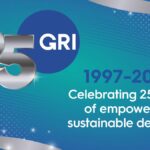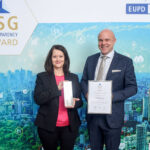This year, GRI celebrates its 10 year anniversary in the Netherlands. The last 10 years have been quite a journey, with no shortage of highlights.
GRI was founded in Boston in 1997 by the US non-profit organizations the Coalition for Environmentally Responsible Economies (CERES) and the Tellus Institute. In 1998 a multi-stakeholder Steering Committee was established to develop GRIs first guidance. A pivotal mandate of the Steering Committee was to do more than the environment. On this advice, the scope of the guidance was broadened to include social, economic, and governance issues. The guidance became a Sustainability Reporting Framework, with Reporting Guidelines at its heart.
The first version of the Guidelines was launched in 2000. The following year, on the advice of the Steering Committee, CERES separated GRI as an independent institution.
The second generation of Guidelines, known as G2, was unveiled in 2002 at the World Summit on Sustainable Development in Johannesburg, South Africa. GRI was referenced in the World Summits Plan of Implementation. The United Nations Environment Program (UNEP) embraced GRI and invited UN member states to host it. The Netherlands was chosen as host country. (Dutch: Voorpagina Financieel Dagblad 9 april 2002: "Piet Sprengers, toenmalige directeur van de Vereniging van Beleggers voor Duurzame Ontwikkeling (VBDO) en Folkert van der Molen van advies- en ingenieursbureau DHV hebben actief gelobbyd om het internationale hoofdkantoor naar Nederland te halen".
In 2002, GRI was formally inaugurated as a UNEP collaborating organization, and relocated to Amsterdam as an independent non-profit organization. Ernst Ligteringen was appointed Chief Executive and a member of the Board.
The uptake of GRIs guidance was boosted by the 2006 launch of the current generation of Guidelines, G3. Over 3000 experts from across business, civil society and labor participated in G3s development.
After G3 was launched, GRI expanded its strategy and its Reporting Framework, and built powerful alliances. Formal partnerships were entered into with the United Nations Global Compact, the Organization for Economic Co-operation and Development, and others. A regional GRI presence was established with Focal Points, initially in Brazil and Australia and later in China, India and the USA. A sixth Focal Point office is now being set up in South Africa.
Sector-specific guidance was produced for diverse industries in the form of Sector Supplements. Educational and research and development publications were produced, often in collaboration with academic institutions, global centers of excellence and other standard-setting bodies. GRIs services for its users and network expanded to include training and coaching, software certification, guidance for small and medium sized enterprises to start reporting, and certifying completed reports.
GRIs outreach was strengthened by its biannual Amsterdam Conference on Sustainability and Transparency, beginning in 2006; the third Conference in May 2010 attracted over 1200 delegates from 77 countries, and the fourth will be held in May next year.
In March 2011, GRI published the G3.1 Guidelines an update and completion of G3, with expanded guidance on reporting gender, community and human rights-related performance. GRI is now finalizing the development of the fourth generation of the Guidelines G4 to be launched at the Conference in May 2013.
Our world has changed a lot in the past ten years our economy, environment and society have evolved, and sustainability is driving this change, says Ernst Ligteringen, GRIs Chief Executive. Sustainability reporting has already helped thousands of companies by making the issues concrete and relevant to their operations and strategy. And now is the time to move to the next stage. To make our economy sustainable and ensure it remains competitive, sustainability reporting has to become standard practice. Therefore GRI aims to help many more companies, as well as investors, policy makers, and other stakeholders, to discover through reporting how sustainability can concretely help to build better companies and make a better world.



